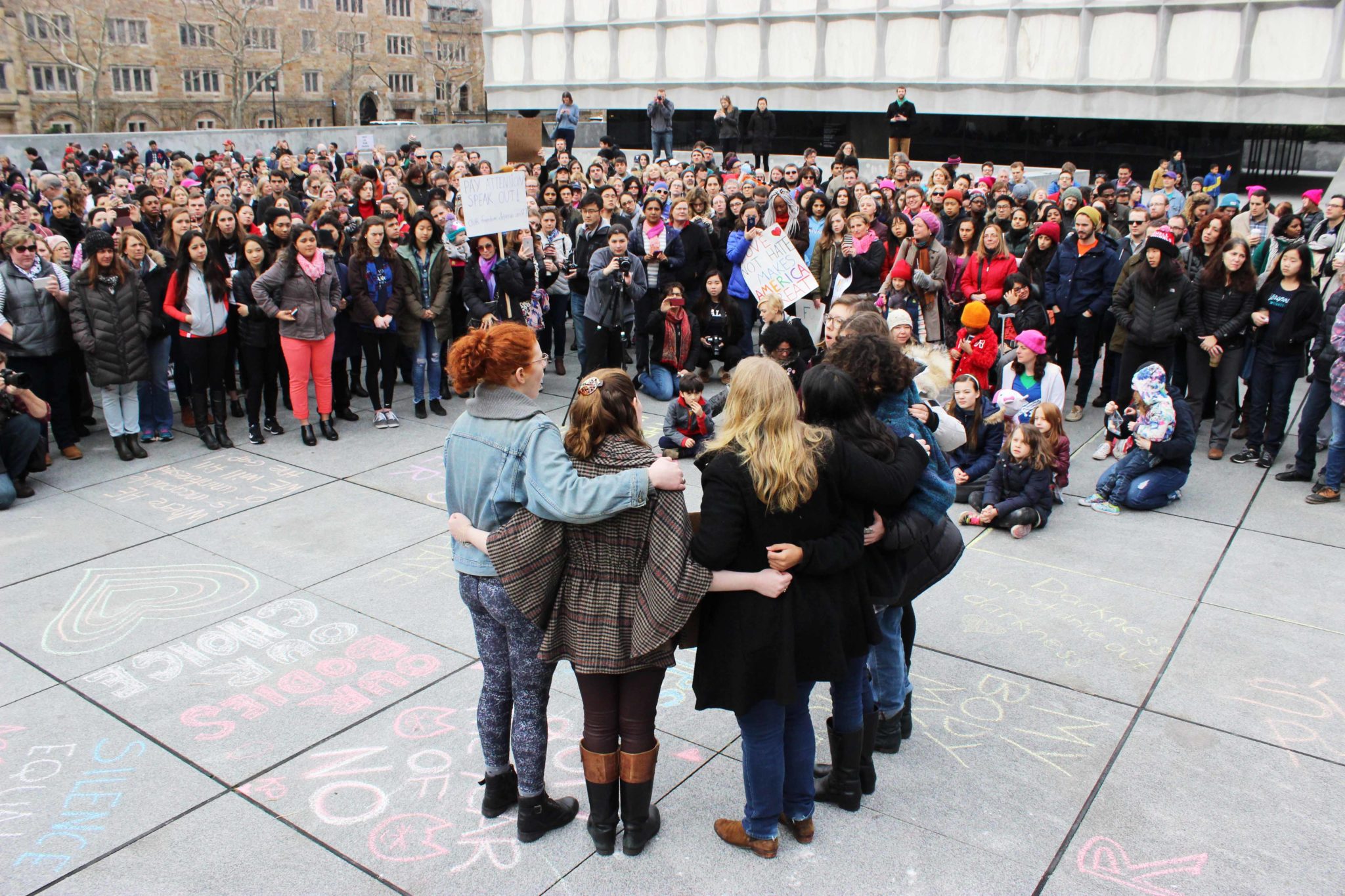
Beinecke Plaza was awash in pink as hundreds of Yale students and New Haven residents joined millions across the country in a series of Women’s Marches, which together made the largest inaugural protest in American history.
The Women’s March on Yale, a one-hour chalk-in rally promoting women’s rights, hosted a four-speaker panel of both Yale professors and student activists, as well as a performance from Yale’s all-female a cappella group Whim ’n Rhythm.
“We see the discrimination that still exists is not subtle,” Frances Rosenbluth, a political science professor who spoke on the panel, told the crowd. “That means we still have to fight for equality. It is fragile and needs nurturing.”
The event was organized by Women’s March on Washington college liaisons at Yale, with support from groups like the Yale Women’s Center and Yale College Democrats.
Speaking before those gathered, Rosenbluth encouraged participation in political discourse at the local level, including voting in the congressional race next year. City and state governments’ support for women’s rights are instrumental in combating inequality, she said, adding that Americans should pursue a change in traditional gender roles and family structures.
In a speech, American Studies professor Michael Denning GRD ’84 urged the protesters to “remain true to the poetry” of the women’s resistance movement. He jabbed at Trump’s incoming administration, characterizing Trump’s cabinet picks as “a charade of fossil fuel fossils, hedge fund fraudsters, cashiered generals and subprime realtors.”
Alongside Yale faculty, undergraduates Ashia Ajani ’19 and Esther Ritchin ’20 perched themselves near the flagpole on Beinecke Plaza and addressed the crowd.
Ajani, a member of the Yale Women’s Center board, shed light on the importance of standing up for marginalized women across the globe. She encouraged the crowd to fight for the rights of sex workers, “trans sisters, incarcerated sisters” and for the reproductive rights of indigenous women.
Ritchin, a YTV staff reporter for the News, performed a piece of slam poetry that she had written on the day after the presidential election. Much of the Yale community is hurting in the wake of Trump’s election, Ritchin said, but with that hurt comes the support of friends and family.
“We mourn, but we mourn together,” Ritchin said, adding that after a period of “mourning,” Yale students must return to their studies in order to advance the causes they care about.
City residents in attendance came from a multitude of backgrounds, but were united behind the common cause of women’s rights.
For Gwen Petti, a resident of New Haven for 16 years, the event brought back memories of activism from her youth. When her mother protested the Vietnam War, she pushed Petti through the protest in a stroller. As Petti grew older, she walked alongside her mother in movements like Ban the Bomb and Burn the Bra. When she was finally old enough to protest on her own, she frequently marched in New York City against nuclear weapons.
“It’s been really complacent in the U.S. for quite a while,” she observed.
But with the country in a dire political climate, Petti said, this was her first rally in quite some time.
For others, rallies like the Women’s March on Yale were one of several demonstrations they attended since the 2016 presidential election.
Last week, local residents Betty Montagano and Susan Israel ’88, a staff reporter for the News while at Yale, traveled to Hartford’s health care rally that pushed to save the Affordable Care Act.
“We feel like we have to speak out,” Montagano said. “It’s a country that’s for the people. Evidently, [members of the Trump administration] are not [the people].”
Sarah Young ’20, one of the student organizers, said that she had originally planned to join the march in Washington, but ultimately decided against the idea because it might be “anxiety-inducing.”
“Everyone should do what they feel comfortable doing and what they can do,” Young said. “That being said, the next four years are going to be about pushing our limits and pushing our comfort zones.”
After listening to the speakers and singers and then chalking messages of support for women’s rights, hundreds of rally attendees joined protestors from the New Haven Green and marched around the perimeter of the Green’s east side.
The Women’s March series included events on every continents and totaled more than 2 and 3 million participants.







